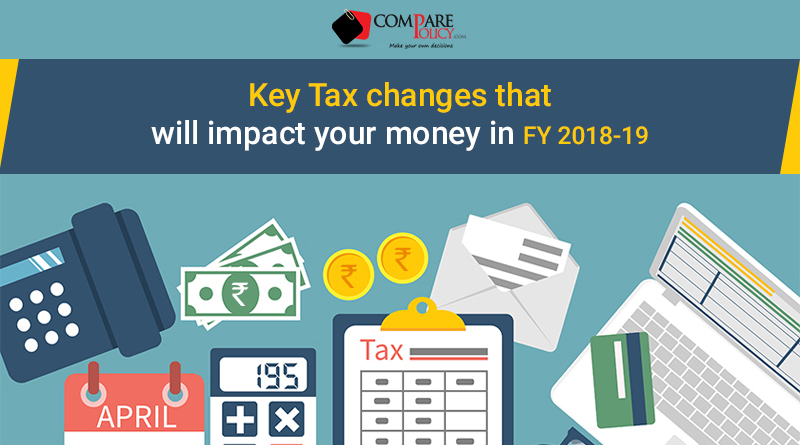Important Tax Changes impacting your money in FY 2018-19
While announcing budget 2018, the Finance Minister Mr. Arun Jaitley had proposed some major changes in the income tax laws, which becomes effective from the beginning of the FY 2018-19, i.e., April 1st, 2018. These new tax rules will have an impact on one’s finances and tax planning, so it becomes extremely important for every taxpayer to be aware of them.
Table Content
1) Standard Deduction
Salaried people from the FY 2018-19 are entitled to a standard deduction up to Rs 40,000. This deduction can be availed against the salary received by the employer during this year. Pensioners who do not enjoy any allowance for transport and medical expenses will now be able to claim this benefit against the pension received. The tax exemption in respect of transport allowance of Rs 19,200 and reimbursement of medical expenses of Rs 15,000 has now gone away with the introduction of standard deduction of Rs 40,000.
This tax deduction of Rs 40,000 will be made directly from your salary, and you are not required to submit any investment proof or bills to take advantage of the benefit. This standard deduction has resulted to avail the net reduction of Rs 5,800 in the amount of taxable salary, in comparison to previous financial years.
2) Long Term Capital Gain (LTCG) Tax on Equity Investment
One of the major inclusion in budget 2018 is the re-introduction of LTCG (long term capital gains) tax on equity investments. A 10% LTCG tax will be imposed on profits arising from the sale of equity-oriented mutual fund schemes and equity shares. This tax will be applicable, in case of capital gains exceeding Rs 1 lakh during a financial year. LTCG tax will be implemented from the beginning of FY 2018-19. Moreover, no benefit of indexation will be provided while computing taxes.
On the other hand, Unit Linked Insurance Plans (ULIPs) are not under the purview of capital gains tax and allows investors to enjoy potential returns by investing in equity based funds along with a life insurance cover.
3) DDT on Equity Mutual Funds
In Budget 2017-18, Dividend Distribution Tax (DDT) has been introduced at the rate of 10% (11.648 %, including surcharge and cess) on income distributed to investors by equity-oriented mutual funds. The fund houses will deduct DDT before distributing a dividend, which will reduce the net return to the investor upon opting for the dividend option. It’s a good time for investors who rely on dividends from equity funds to take a review of their investment strategy.
4) Enhanced Tax Benefits for Senior Citizens
The limit of the tax deduction for senior citizens towards health insurance premium and medical expenditure has been extended from FY 2018-19 onwards. The tax deduction limit for health insurance premium has been increased to Rs 50,000 (Rs 30,000 till FY 2017-18), and it is applicable under section 80D of the Income Tax Act. The tax deduction limit towards medical expenses for specified critical illnesses has been increased to Rs 1 lakh for both senior citizen (earlier Rs 60,000) and super senior citizen (earlier Rs 80,000). This benefit can be availed under section 80DDB.
The tax exemption limit on interest income for senior citizens has been increased from Rs 10,000 to Rs 50,000 during a year, w.e.f April 1st, 2018. Till FY 2017-18, the exemption of interest income up to Rs 10,000 was available under section 80 TTA. With the introduction of a new section 80 TTB, the interest received from banks, cooperative banks and post office, whether on savings bank account, fixed deposits, or recurring deposits will be eligible for this tax exemption. No separate deduction under section 80 TTA for interest income can be availed from April 1st, 2018.
There is a major relief for senior citizens regarding tax savings, and they can earn higher interest income and enhanced deduction limit for health insurance premium.
5) Longer lock-in for Bonds
You can avail a tax deduction for any capital gain arising from the transfer of a long-term capital asset when invested in the long-term specified asset at any time during six months from the date of such transfer. From April 1st, 2018, the holding period of bonds under section 54EC has been increased from three years to five years. It means from FY 2018-19 onwards; you have to keep your money locked in the 54EC bonds for five years to get the tax exemption. Also, the budget has also proposed to restrict the definition of the capital asset to land or building or both only.
6) Rise in Education Cess on Income Tax
The finance minister has proposed to increase the education cess from FY 2018-19 onwards. The education cess on income tax has been increased from 3% to 4%, resulting in the increase in tax liability for every taxpayer. For taxpayers in the highest tax bracket, the tax liability will increase to 31.2%, for those who belong to middle tax bracket, the tax liability will increase to 20.8%, and for those who belong to the lowest tax bracket, the tax liability will increase to 5.2%.
7) NPS Exemption for the Self-Employed
The government in the budget 2018 has proposed an extension of tax-free withdrawal from NPS (National Pension System) to self-employed subscribers which will be applicable for FY 2018-19. Till FY 2017-18, an employee can only avail the tax exemption for 40% of the total amount payable on the closure of the account. This move will bring equivalence between non-salaried and salaried subscribers of the NPS.
Final Thoughts
Every year, the budget comes with several changes in income tax laws, and you need to keep yourself updated that will help you to make smarter financial decisions. With the announcement of budget 2018, you are advised to review your investment strategies that can ensure optimum return on investment along with effective tax planning.
Note: Income Tax Slab Rates FY 2020-21 and Investment Option for tax saving options in FY 2020-21

